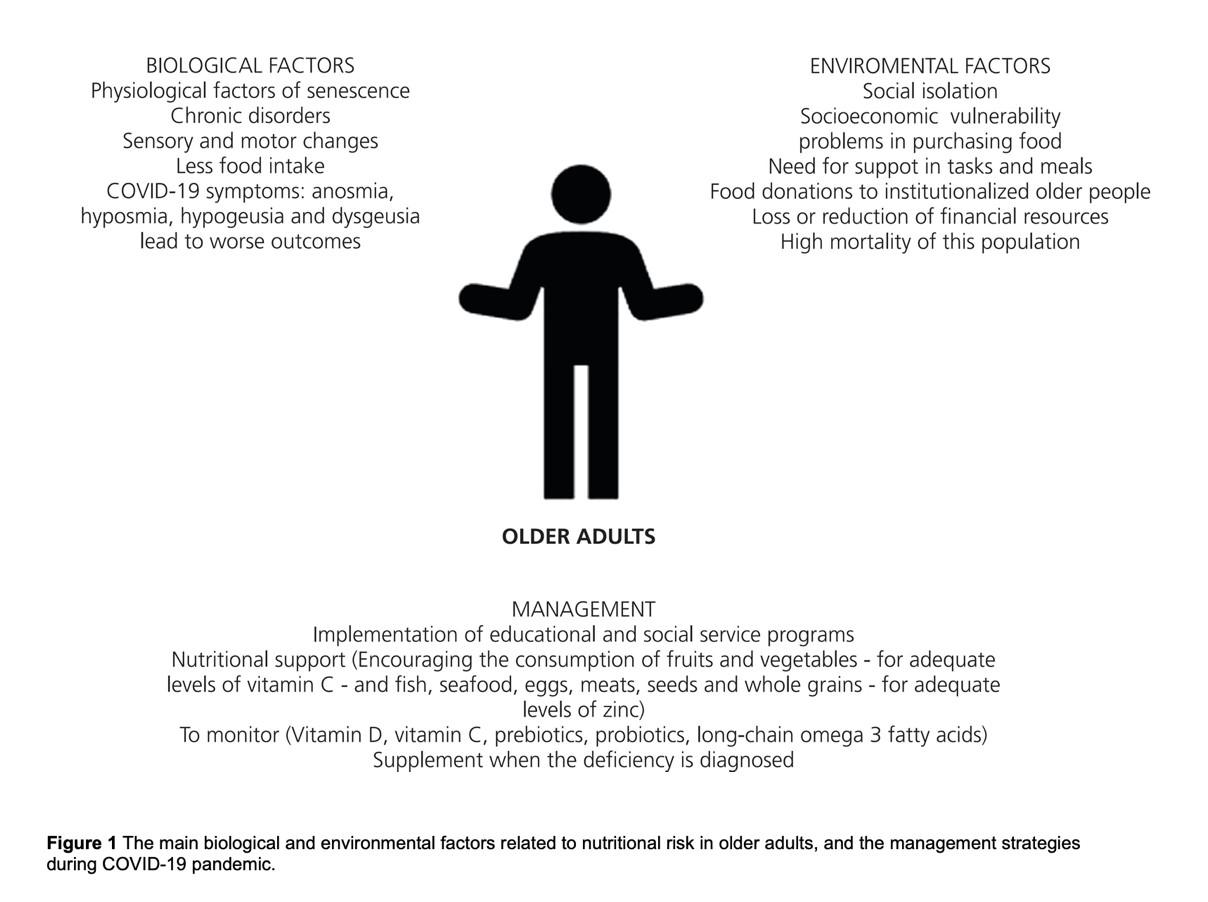Gliciane Ceolin, doctoral student of Programa de Pós-Graduação em Nutrição, Universidade Federal de Santa Catarina. Florianópolis, SC, Brazil.
Bruna Cunha Mendes, doctoral student of Programa de Pós-Graduação em Nutrição, Universidade Federal de Santa Catarina. Florianópolis, SC, Brazil.
Jaqueline Schroeder, master’s of Programa de Pós-Graduação em Nutrição, Universidade Federal de Santa Catarina. Florianópolis, SC, Brazil.
 Recently, researchers in the field of Nutrition at the Federal University of Santa Catarina (UFSC) published the article “Nutritional challenges in older adults during the COVID-19 pandemic” of the Revista de Nutrição de Campinas on nutritional challenges in the health of the elderly in times of COVID-19 pandemic. The study consisted of a search of the literature in the main databases on the subject, mainly considering guidelines from official agencies (Ministério da Saúde – Brazil, 2020) and also examples of strategy from other countries.
Recently, researchers in the field of Nutrition at the Federal University of Santa Catarina (UFSC) published the article “Nutritional challenges in older adults during the COVID-19 pandemic” of the Revista de Nutrição de Campinas on nutritional challenges in the health of the elderly in times of COVID-19 pandemic. The study consisted of a search of the literature in the main databases on the subject, mainly considering guidelines from official agencies (Ministério da Saúde – Brazil, 2020) and also examples of strategy from other countries.
Regarding the documents and studies found, we discuss the main biological and environmental factors related to nutritional risk in the elderly, such as socioeconomic insecurity, which could affect food acquisition and the need for support in daily tasks and meals. The institutionalized older adults often depend on food donations, which may have reduced due to the economic crisis caused by the pandemic, and the aging process itself causes changes in physiological, nutritional necessities and eating habits.
In addition, we present what is being done in this context of contagion control of COVID-19 to minimize nutritional risk among the elderly, reviewing some important strategies, such as the main dietary recommendations, the suggestion of individual or family nutritional advice on food choices for maintaining nutritional status (Petretto DR, Pili R., 2020). The use of television and video calls, remote assistance by nutritionists and contact, even if virtual, between family members and the elderly during meals, since it has been shown that meals eaten in company favor the quality of the diet, are other strategies addressed besides them, global and governmental tactics can be implemented.
Healthy aging is already a major challenge, in the context of the COVID-19, this becomes more evident, and nutritionally, the pandemic has a great impact on this population. Elderly people should be prioritized in minimizing exposure to nutritional risk and COVID-19.
References
PETRETTO D. R. et al. Ageing and COVID-19: what is the role for elderly people? Geriatrics [online]. 2020, vol. 05, no. 02, pp. 25 [viewed 10 December 2020]. https://doi.org/10.3390/geriatrics5020025. Available from: https://www.mdpi.com/2308-3417/5/2/25
Recomendações de alimentação para pessoas idosas no Brasil durante a pandemia de Covid-19 [online]. Ministério da Saúde. 2020 [viewed 10 December 2020]. Available from: http://docs.bvsalud.org/biblioref/2020/05/1096492/recomendacoes_alimentacao_pessoas_idosas_brasil_covid-19.pdf
To read the article, acess
CEOLIN, G. et al. Nutritional challenges in older adults during the COVID-19 pandemic. Revista de Nutrição [online]. 2020, vol. 33 [viewed 10 December 2020]. https://doi.org/10.1590/1678-9865202032e200174. Available from: http://ref.scielo.org/tmf559
External links
Revista de Nutrição – RN: https://www.scielo.br/rn
Como citar este post [ISO 690/2010]:


















Recent Comments